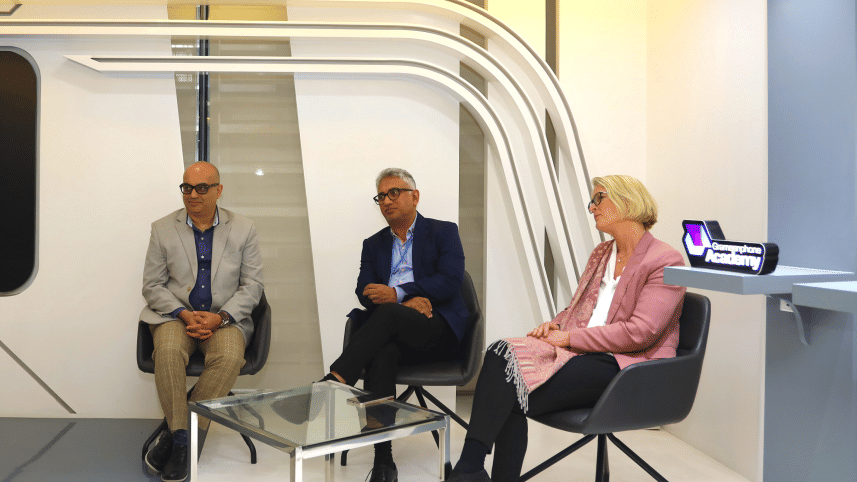Grameenphone Academy: A step towards getting the workforce future-ready

In a brand new initiative to make the youth of today ready for the workplace of tomorrow, Grameenphone has launched Grameenphone Academy to train fresh graduates for local and global professional challenges. Courses provided by Grameenphone Academy (https://grameenphone.academy/) are designed to build industry skills, entrepreneurship acceleration and make the Bangladeshi youth future-ready and more efficient and competitive in the workforce.
In a sit-down interview, Toggle had a conversation with Cecilie B. Heuch, EVP and Chief People Officer, Telenor Group; Yasir Azman, CEO, Grameenphone and Syed Tanvir Husain, CHRO, Grameenphone, to understand the philosophy, motivation, outlook and impact of Grameenphone Academy.
What was the motivation behind Grameenphone Academy?
Cecile: As a telecommunications company we have a big role to play when it comes to digitising countries like Bangladesh - where we have seen a distinct digital divide and a lack of digital skills. Bangladeshi youth have the potential to grow, and we have the opportunity to help them. An initiative like Grameenphone Academy can help them grow and bridge the digital skills gap.
How does this project align with Telenor's vision?
Cecile: Climate, environment and digital skills are areas where we as a telecommunication company can make a bigger difference than others. As we have seen with Covid-19, there has been a fast track of digitalisation in every aspect of society. This led to a bigger gap in skills and expectations, which is widening every day. Thus, we need to provide solutions to bridge that gap and give youth the opportunities to be competitive in both local and global markets.
Where do you think Bangladesh stands in terms of skills, competency and talent?
Yasir: Going by the statistics, the Bangladeshi youth population is very resilient. Aside from environmental factors such as natural disasters and the climate, there are many obstacles. However, despite being in such constrained situations, the country is progressing, both in terms of growth and innovations. The attitude and resilience are already there, but we need to bridge those factors with the right skill set to truly unleash the potential of the Bangladeshi youth. We need to inspire them by bringing in the right tools and equipment while showing them the correct path - that is what I believe a leader must do in society.
Do you think there is a noticeable lack in the current global market or is this lack limited to Bangladesh only?
Yasir: In the current post-pandemic times, we have seen an acceleration of digitalisation. Society has fast-tracked in many senses, but it left behind a gap in the right skills. This is, however, a universal issue at this point, and not just in Bangladesh only. Even our global and technological partners are also struggling when retaining talented sources. Since this is a global challenge, we need to bring solutions fast.
What are some common skills and knowledge areas that are currently lacking in the global and local markets?
Cecile: I would say the most common required skill sets would be cybersecurity, artificial intelligence, blockchain, machine learning, data analysis, cloud management, etc.
Tanvir: Every year about 400,000 students are becoming graduates. However, they don't get jobs right after graduation, staying unemployed. If they have the right skills and find the right job, imagine how well they can fuel the national economy and boost their own growth momentum. If we look into the global perspective, most of the students who are working said that they had to take extra courses and training sessions to match their requirements from employers, alongside what they have learned from universities. The curriculum itself is not sufficient to be active, productive or efficient in workplaces. Thus, the gap definitely exists globally. Corporations will have to work very closely with universities to bridge this gap. Grameenphone Academy is an example of such an effort in bridging that gap.
Are existing Grameenphone employees also trained to keep up with current market demands?
Cecile: Internally, our employees need to stay updated as well. We have to renew their skill sets and make sure they are sufficiently upskilled. If you want to be an attractive employer, you need to have these things. People are not always loyal to their employers but they are loyal to their own skill and competency development.
What are your expectations regarding Grameenphone Academy?
Yasir: We want to come to a position where we can collaborate with others and create an impact together. We have the potential to become a knowledge-based economy and create a collaborative platform where we can inspire others to join. If we can make that happen, we can bring economic freedom to the youth and take the country towards bigger goals. Thus, the expectations for the future include making people independent and economically free.
Do you think other companies in the industry would follow suit and open similar platforms? Would they contribute towards upskilling development in Bangladesh?
Tanvir: This is an area everyone is talking about and willing to contribute. In Bangladesh, as a private sector, we have taken the lead. Other organisations are now willing to join and they have the same intention. In this area, we don't want to compete, but rather collaborate to create a bigger impact.
When is Grameenphone Academy going to be publicly available? Would it be free for everyone? What kind of courses and faculties would be available?
Yasir: Grameenphone Academy is free and open for everyone. Our main intention is to prepare fresh graduates for the job market. We have a launching pad and career development courses instructed by industry readers from various sectors. There are also specific training programs, especially on the digital skill side, alongside a module called entrepreneurship development, which we have been working on for the last 5 years. We also have an accelerator program where we take the students to a four-month boot camp.
Cecile: Regarding the courses, some of our focus areas are cybersecurity and Python programming.
Is Grameenphone Academy going to be helpful for existing Grameenphone employees, especially those who want to further develop their skills?
Tanvir: We are very big in upskilling and reskilling our employees, but skills are changing faster every day. We have to keep our employees relevant. It's only possible when we take them through a structured learning process. We are one of the only companies in Bangladesh that give bonuses to their employees for going through training. Every employee must reach 40 hours of training each year, but our employees reach an average of 60 hours. During the pandemic, we blocked everyone's calendar for one hour every year and dedicated it as a learning hour. We are very serious about training and development. Every employee discusses with their line manager individual development plans based on their knack. Our employees also contribute to different projects in fluid capacity, which might require different skill sets than what they do normally. To sustain a multiskilled workforce, you need a robust training and development program. GP Academy would only complement this.
Is there any certification enabled with this program that can be recognised by other employers?
Tanvir: Top performers will get a ticket to participate in our recruitment interview process. They can skip a few steps because they are graduates of Grameenphone Academy. Regarding certification, students who pass our courses can get a national level certificate. There will be exams monitored or conducted by the government authority so that the certificate is valued by anybody and everybody within Bangladesh.
Are there any similar platforms available in other Telenor operations?
Cecile: We are going to have a similar collaboration with Cisco in Thailand. The initiative won't be exactly the same, but it is going to be in line with Grameenphone Academy.
Any final words you would like to share, regarding helping the youth?
Yasir: We would like to increase impact through collaboration, inclusiveness and addressing the needs and challenges of today's youth.
Cecile: We are trying to prepare the youth with skills that are needed for the future in terms of technology and soft skills. We can come together to create a future-ready Bangladesh. The youth is the powerhouse that can propel the economy and really help us to reach the ambition of digital and smart Bangladesh.




 For all latest news, follow The Daily Star's Google News channel.
For all latest news, follow The Daily Star's Google News channel.
Comments